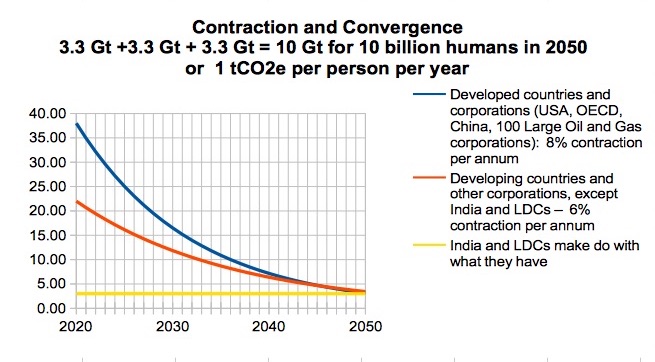The great thing about the COVID-19 crisis is that the bourgeoisie has been revealed to be sheeplike in their behaviour, which is very good news for climate justice. An example comes from India. When the Government called for a lockdown, the 15 million tax payers in India took to home isolation like fish to water. If India had been the country just of these tax payers, the COVID-19 numbers would be like those of a typical middle income country like Portugal: moderate rates of testing, moderate rates of infection, moderate death rates, and serious loss of their GDP. The instant behavioural change of the bourgeoisie at the behest of their Government, as if remote controlled by the press of button, shows just how easy it is to change their behaviour if Governments command them to do so, even if it crashes their income from rents. Rents, – the technical Marxist economic word for the surplus that investors extract from labour through capitalism -, are the first thing to go when capitalist companies go bankrupt. And as it turns out, when the bourgeoisie are scared to death of a virus, they are willing to sacrifice even their rents. This behavioural change of the kind we saw over the last few weeks of the Coronacene in countries as diverse as the UK, USA, Russia and China, is also needed to achieve contraction and convergence of greenhouse gas emissions in order to achieve energy equity and the survival of the biosphere for the sake of the human species. The bourgeoisie who own global Fortune 500 companies loose their rents and in return they gain the survival of the biosphere. Associations of independent producers owned by councils, Gram Panchayats and local governments thereafter take over and grow food, forests, fodder and fuel, – taking the place of capitalist corporations -, and produce the essential needs for humanity.
Contraction and convergence means contracting the emission of greenhouse gases to levels that the biosphere can reabsorb, and converging the energy production and consumption levels of all human beings to an equitable sustainable level. The equitable sustainable level of emissions of carbon dioxide equivalent from burning coal, oil, natural gas or biomass, is 1000 kWh of electricity consumption from coal per person per year (1 MWh) that emits around 1 kilogram of carbon dioxide per kWh. 10 billion humans would emit 10 billion tonnes of carbon dioxide equivalent greenhouse gases: one sixth of the level emitted by the human species in 2019. Biomass growing at the rate of 1 tonne of carbon sequestration per person per year in trees, crops, root systems, mycelium, and animals is the equivalent of 3.7 tonnes of carbon dioxide sequestration per year: more than enough to make up for a person’s fossil fuel electricity or fuel consumption at the sustainable level and more than achievable if each person has access to 1 acre of land.
In India and other Least Developed Countries this is the current level of emissions, but sequestration is lagging and needs to be encouraged. Changing the behaviour of the 15 million Indian tax payers so that they work on the land like the rest of 1.3 billion Indians, instead of as rentiers, will do the trick. In the rest of the world contraction and convergence can be commanded by Governments in a manner no less or more stringent than what was done during the COVID-19 lockdowns.

Chart 1 shows the major groups of countries and corporations and the needed change in behaviour by these groups. By 2050 the total global emissions reduce to 10 Gigatonnes of carbon dioxide equivalent from the current annual emissions of 60 Gigatonnes carbon dioxide equivalent.
Behavioural change in order to survive as a species can be brought about as easily as switching a switch: Government commands and the organism obeys. Therein lies the key to energy equity and the survival of the biosphere. All that Governments need to do is lockdown the economy and supply a minimum electricity of 1 MWh (1000 kWh) per person per year and an acre of land. Human beings in associations of forestry producers will take care of their own survival thereafter, with no negative impact on the biosphere.
Anandi Sharan was born in Switzerland, educated in the UK, lived in Karnataka villages for many years, now lives in Bangalore and last year worked in Araria District in Bihar. She works now on trying to find the best money system to help people adapt to climate change especially in India.
SIGN UP FOR COUNTERCURRENTS DAILY NEWS LETTER










































